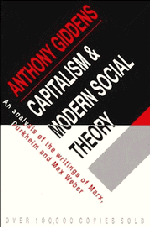Book contents
- Frontmatter
- Contents
- Acknowledgements
- Preface
- Introduction
- List of abbreviations used
- Dedication
- Part 1 Marx
- Part 2 Durkheim
- 5 Durkheim's early works
- 6 Durkheim's conception of sociological method
- 7 Individualism, socialism and the ‘occupational groups’
- 8 Religion and moral discipline
- Part 3 Max Weber
- Part 4 Capitalism, socialism and social theory
- Postscript: Marx and modern sociology
- Bibliography of works cited in text
- Index
7 - Individualism, socialism and the ‘occupational groups’
Published online by Cambridge University Press: 05 August 2013
- Frontmatter
- Contents
- Acknowledgements
- Preface
- Introduction
- List of abbreviations used
- Dedication
- Part 1 Marx
- Part 2 Durkheim
- 5 Durkheim's early works
- 6 Durkheim's conception of sociological method
- 7 Individualism, socialism and the ‘occupational groups’
- 8 Religion and moral discipline
- Part 3 Max Weber
- Part 4 Capitalism, socialism and social theory
- Postscript: Marx and modern sociology
- Bibliography of works cited in text
- Index
Summary
The confrontation with socialism
The theory developed in The Division of Labour, and Durkheim's subsequent attempts to pursue themes originally set out therein, inevitably culminated in bringing about a direct confrontation with socialist doctrines. According to Mauss' testimony, while Durkheim was a student, he had already decided to devote himself to study of ‘the relationship of individualism and socialism’. Durkheim was familiar with the doctrines of Saint-Simon and Proudhon at this time, and had made an initial acquaintance with Marx's writings. But his knowledge of socialist theory was, at the time of the writing of The Division of Labour, fairly thin. The sort of socialism with which Durkheim was most closely concerned in the early part of his career was the reformist social democratic theory such as set out by Schäffle and the Kathedersozialisten.
In both The Division of Labour and Suicide, and in numerous other writings, Durkheim makes reference to the crisis which is being experienced in contemporary societies. This is not, as The Division of Labour made clear, primarily a crisis which has economic roots, nor one which can be solved by economic measures. It follows from this that the sort of programmes offered by most socialists – involving mainly the redistribution of wealth through centralised control of the economy – in Durkheim's view fail to grasp the most significant problems which face the modern age. Socialism is an expression of the malaise of contemporary society, but it is not itself an adequate basis for the social reconstruction necessary to overcome it.
- Type
- Chapter
- Information
- Capitalism and Modern Social TheoryAn Analysis of the Writings of Marx, Durkheim and Max Weber, pp. 95 - 104Publisher: Cambridge University PressPrint publication year: 1971



